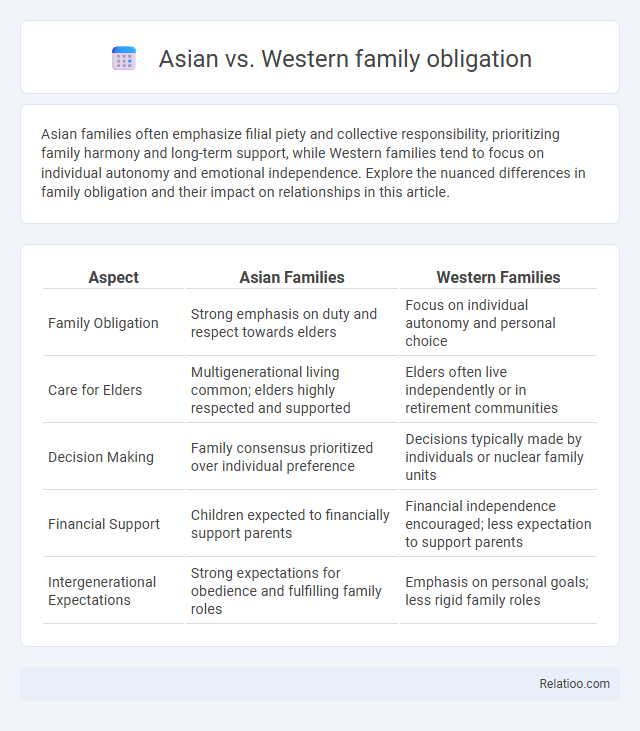Asian families often emphasize filial piety and collective responsibility, prioritizing family harmony and long-term support, while Western families tend to focus on individual autonomy and emotional independence. Explore the nuanced differences in family obligation and their impact on relationships in this article.
Table of Comparison
| Aspect | Asian Families | Western Families |
|---|---|---|
| Family Obligation | Strong emphasis on duty and respect towards elders | Focus on individual autonomy and personal choice |
| Care for Elders | Multigenerational living common; elders highly respected and supported | Elders often live independently or in retirement communities |
| Decision Making | Family consensus prioritized over individual preference | Decisions typically made by individuals or nuclear family units |
| Financial Support | Children expected to financially support parents | Financial independence encouraged; less expectation to support parents |
| Intergenerational Expectations | Strong expectations for obedience and fulfilling family roles | Emphasis on personal goals; less rigid family roles |
Introduction to Family Obligation in Asian and Western Cultures
Family obligation in Asian cultures often emphasizes collective responsibility, filial piety, and respect for elders, reflecting deep-rooted values shaped by Confucianism and communal living. Western family obligation tends to prioritize individual autonomy and nuclear family independence, highlighting personal choice alongside familial support. Understanding these cultural nuances helps you navigate the distinct expectations surrounding family roles and responsibilities across Asian and Western contexts.
Historical Roots of Family Responsibility
Asian family obligation historically stems from Confucian principles emphasizing filial piety, ancestral reverence, and collective well-being, enforcing strong intergenerational duties. Western family responsibility traditionally emerges from Judeo-Christian and Greco-Roman influences, often highlighting individual rights balanced with familial support. These historical roots shape distinct cultural expectations, where Asian societies prioritize family harmony and elder care, while Western contexts promote autonomy alongside familial responsibility.
Core Values: Collectivism vs Individualism
Asian family obligation emphasizes collectivism, prioritizing family harmony, respect for elders, and mutual support as core values that bind generations together. Western family obligation leans toward individualism, promoting personal autonomy, self-expression, and independence within familial relationships. Your understanding of these differing core values can enhance cross-cultural communication and foster empathy in diverse family dynamics.
Expectations for Elderly Care
Asian family obligations often emphasize multigenerational cohabitation and direct elder care within the household, reflecting deep-rooted cultural values of filial piety and respect. Western family expectations tend to support elderly independence through professional care services, balancing family involvement with personal autonomy. Understanding these differences helps you navigate and respect diverse approaches to elder care and familial duties.
Financial Support Traditions
Asian family obligation often emphasizes multigenerational financial support, where You are expected to contribute consistently to the household and elder care, reflecting deeply ingrained cultural values. In contrast, Western family obligation traditions prioritize individual financial independence, with support usually provided more sporadically or during major life events. These differing approaches highlight the strength of collective responsibility in Asian families versus Western ideals of autonomy in managing family finances.
The Role of Children in the Family Unit
In Asian cultures, children often bear significant responsibility for supporting elderly parents financially and emotionally, reflecting deeply rooted Confucian values of filial piety and intergenerational duty. Western families tend to emphasize individual autonomy, with children encouraged to pursue independence while maintaining emotional support rather than direct caregiving roles. The role of children in the family unit is thus shaped by cultural norms that influence expectations regarding caregiving, financial support, and emotional bonds within multi-generational households.
Attitudes Toward Independence and Autonomy
Asian family obligation often emphasizes collective responsibilities and interdependence, where your decisions are closely tied to family expectations and honor. Western family obligation tends to prioritize individual autonomy and independence, encouraging you to make personal choices even if they diverge from family desires. Understanding these contrasting attitudes highlights the cultural dynamics shaping family roles and personal freedoms.
Impact on Career and Personal Choices
Asian family obligations often emphasize collective responsibility and interdependence, deeply influencing career and personal choices by prioritizing family duties and expectations over individual ambitions. Western family obligations tend to value independence, allowing more freedom for You to pursue personal career goals without strong familial pressure. Balancing these cultural expectations directly impacts how individuals navigate job opportunities, relocation, and lifestyle decisions within diverse family structures.
Social Stigma and Family Reputation
In Asian cultures, family obligation is deeply rooted in maintaining family reputation and avoiding social stigma, where individuals often prioritize collective honor over personal desires. Western family obligation tends to emphasize individual autonomy, with less intense pressure related to social stigma and a stronger focus on personal responsibility within family roles. Understanding these cultural dynamics helps you navigate expectations and balance duty with self-expression in diverse social contexts.
Evolving Family Dynamics in a Globalized World
Asian family obligations often emphasize collectivism, respect for hierarchy, and multi-generational support, reflecting deeply rooted cultural values. Western family obligations prioritize individual autonomy and balanced interdependence, shaped by modern societal norms. Your understanding of evolving family dynamics in a globalized world highlights how migration, technology, and cross-cultural interactions are reshaping these traditional frameworks.

Infographic: Asian vs Western family obligation
 relatioo.com
relatioo.com